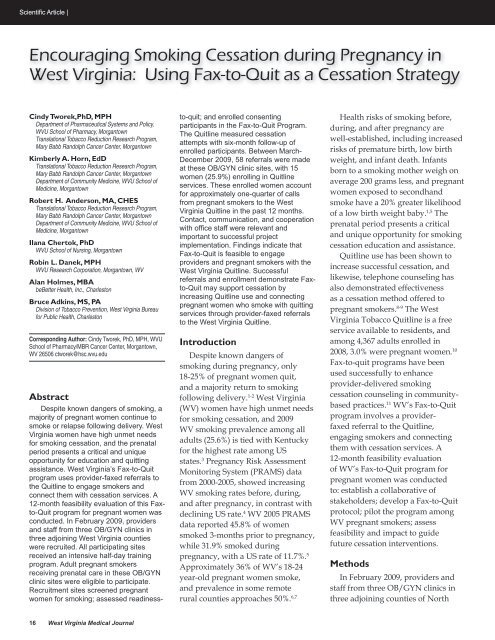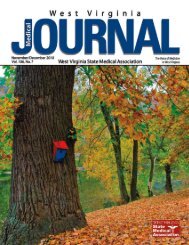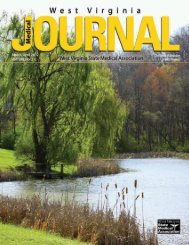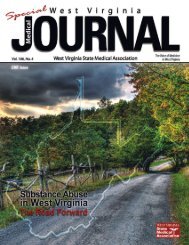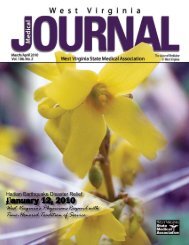March/April - West Virginia State Medical Association
March/April - West Virginia State Medical Association
March/April - West Virginia State Medical Association
Create successful ePaper yourself
Turn your PDF publications into a flip-book with our unique Google optimized e-Paper software.
Scientific Article |<br />
Encouraging Smoking Cessation during Pregnancy in<br />
<strong>West</strong> <strong>Virginia</strong>: Using Fax-to-Quit as a Cessation Strategy<br />
Cindy Tworek,PhD, MPH<br />
Department of Pharmaceutical Systems and Policy,<br />
WVU School of Pharmacy, Morgantown<br />
Translational Tobacco Reduction Research Program,<br />
Mary Babb Randolph Cancer Center, Morgantown<br />
Kimberly A. Horn, EdD<br />
Translational Tobacco Reduction Research Program,<br />
Mary Babb Randolph Cancer Center, Morgantown<br />
Department of Community Medicine, WVU School of<br />
Medicine, Morgantown<br />
Robert H. Anderson, MA, CHES<br />
Translational Tobacco Reduction Research Program,<br />
Mary Babb Randolph Cancer Center, Morgantown<br />
Department of Community Medicine, WVU School of<br />
Medicine, Morgantown<br />
Ilana Chertok, PhD<br />
WVU School of Nursing, Morgantown<br />
Robin L. Danek, MPH<br />
WVU Research Corporation, Morgantown, WV<br />
Alan Holmes, MBA<br />
beBetter Health, Inc., Charleston<br />
Bruce Adkins, MS, PA<br />
Division of Tobacco Prevention, <strong>West</strong> <strong>Virginia</strong> Bureau<br />
for Public Health, Charleston<br />
Corresponding Author: Cindy Tworek, PhD, MPH, WVU<br />
School of Pharmacy/MBR Cancer Center, Morgantown,<br />
WV 26506 ctworek@hsc.wvu.edu<br />
Abstract<br />
Despite known dangers of smoking, a<br />
majority of pregnant women continue to<br />
smoke or relapse following delivery. <strong>West</strong><br />
<strong>Virginia</strong> women have high unmet needs<br />
for smoking cessation, and the prenatal<br />
period presents a critical and unique<br />
opportunity for education and quitting<br />
assistance. <strong>West</strong> <strong>Virginia</strong>’s Fax-to-Quit<br />
program uses provider-faxed referrals to<br />
the Quitline to engage smokers and<br />
connect them with cessation services. A<br />
12-month feasibility evaluation of this Faxto-Quit<br />
program for pregnant women was<br />
conducted. In February 2009, providers<br />
and staff from three OB/GYN clinics in<br />
three adjoining <strong>West</strong> <strong>Virginia</strong> counties<br />
were recruited. All participating sites<br />
received an intensive half-day training<br />
program. Adult pregnant smokers<br />
receiving prenatal care in these OB/GYN<br />
clinic sites were eligible to participate.<br />
Recruitment sites screened pregnant<br />
women for smoking; assessed readinessto-quit;<br />
and enrolled consenting<br />
participants in the Fax-to-Quit Program.<br />
The Quitline measured cessation<br />
attempts with six-month follow-up of<br />
enrolled participants. Between <strong>March</strong>-<br />
December 2009, 58 referrals were made<br />
at these OB/GYN clinic sites, with 15<br />
women (25.9%) enrolling in Quitline<br />
services. These enrolled women account<br />
for approximately one-quarter of calls<br />
from pregnant smokers to the <strong>West</strong><br />
<strong>Virginia</strong> Quitline in the past 12 months.<br />
Contact, communication, and cooperation<br />
with office staff were relevant and<br />
important to successful project<br />
implementation. Findings indicate that<br />
Fax-to-Quit is feasible to engage<br />
providers and pregnant smokers with the<br />
<strong>West</strong> <strong>Virginia</strong> Quitline. Successful<br />
referrals and enrollment demonstrate Faxto-Quit<br />
may support cessation by<br />
increasing Quitline use and connecting<br />
pregnant women who smoke with quitting<br />
services through provider-faxed referrals<br />
to the <strong>West</strong> <strong>Virginia</strong> Quitline.<br />
Introduction<br />
Despite known dangers of<br />
smoking during pregnancy, only<br />
18-25% of pregnant women quit,<br />
and a majority return to smoking<br />
following delivery. 1-2 <strong>West</strong> <strong>Virginia</strong><br />
(WV) women have high unmet needs<br />
for smoking cessation, and 2009<br />
WV smoking prevalence among all<br />
adults (25.6%) is tied with Kentucky<br />
for the highest rate among US<br />
states. 3 Pregnancy Risk Assessment<br />
Monitoring System (PRAMS) data<br />
from 2000-2005, showed increasing<br />
WV smoking rates before, during,<br />
and after pregnancy, in contrast with<br />
declining US rate. 4 WV 2005 PRAMS<br />
data reported 45.8% of women<br />
smoked 3-months prior to pregnancy,<br />
while 31.9% smoked during<br />
pregnancy, with a US rate of 11.7%. 5<br />
Approximately 36% of WV’s 18-24<br />
year-old pregnant women smoke,<br />
and prevalence in some remote<br />
rural counties approaches 50%. 6,7<br />
Health risks of smoking before,<br />
during, and after pregnancy are<br />
well-established, including increased<br />
risks of premature birth, low birth<br />
weight, and infant death. Infants<br />
born to a smoking mother weigh on<br />
average 200 grams less, and pregnant<br />
women exposed to secondhand<br />
smoke have a 20% greater likelihood<br />
of a low birth weight baby. 1,5 The<br />
prenatal period presents a critical<br />
and unique opportunity for smoking<br />
cessation education and assistance.<br />
Quitline use has been shown to<br />
increase successful cessation, and<br />
likewise, telephone counseling has<br />
also demonstrated effectiveness<br />
as a cessation method offered to<br />
pregnant smokers. 8-9 The <strong>West</strong><br />
<strong>Virginia</strong> Tobacco Quitline is a free<br />
service available to residents, and<br />
among 4,367 adults enrolled in<br />
2008, 3.0% were pregnant women. 10<br />
Fax-to-quit programs have been<br />
used successfully to enhance<br />
provider-delivered smoking<br />
cessation counseling in communitybased<br />
practices. 11 WV’s Fax-to-Quit<br />
program involves a providerfaxed<br />
referral to the Quitline,<br />
engaging smokers and connecting<br />
them with cessation services. A<br />
12-month feasibility evaluation<br />
of WV’s Fax-to-Quit program for<br />
pregnant women was conducted<br />
to: establish a collaborative of<br />
stakeholders; develop a Fax-to-Quit<br />
protocol; pilot the program among<br />
WV pregnant smokers; assess<br />
feasibility and impact to guide<br />
future cessation interventions.<br />
Methods<br />
In February 2009, providers and<br />
staff from three OB/GYN clinics in<br />
three adjoining counties of North<br />
16 <strong>West</strong> <strong>Virginia</strong> <strong>Medical</strong> Journal


